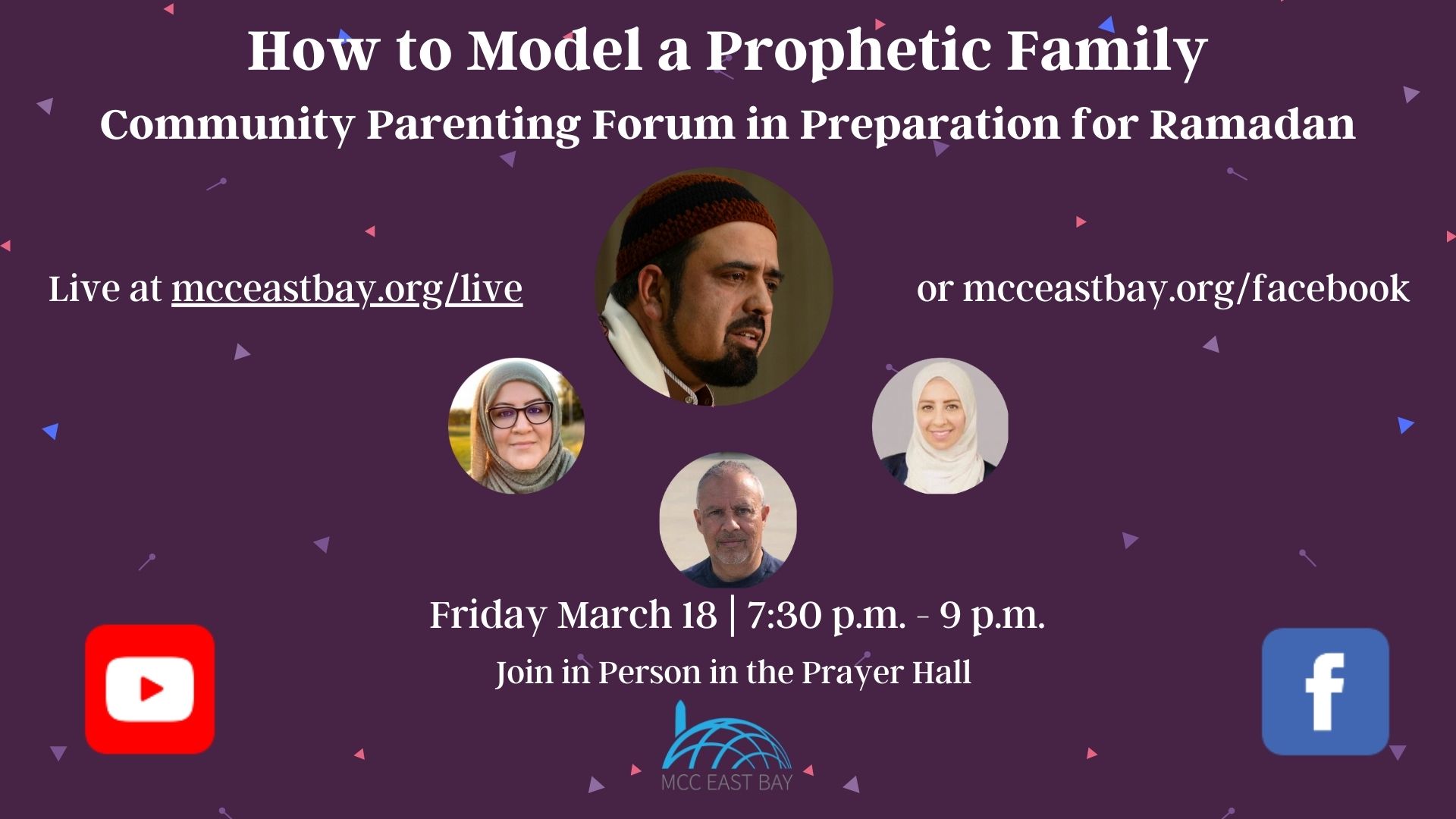In a time where traditional roles and family structures, as well as conservative values, are constantly under attack, it is imperative to bring families together for beneficial reminders about how to build and maintain a happy, healthy, and harmonious home.
Ustadh Feraidoon Mojadedi, Sr. Heba El-Haddad, and Ustadha Hosai Mojaddidi, and Sidi Zeeshan Mukhtar are active community members and parents. They lead this inspiring pre-Ramadan forum on what constitutes a Prophetic family structure and how parents, children, and extended family members play a vital part in its construction and success.
7:30 p.m. to 9 p.m. (Maghrib to Isha) | Friday, March 18 | Free | No registration required | No babysitting provided | Join in-person in the MCC Prayer Hall or online at https://mcceastbay.org/live
Parents and teens encouraged to attend.
Questions and answers will be taken at end of the panel in person and questions in the chatbox on YouTube and Facebook. To anonymously send questions prior to or during the panel: mcceastbay.org/questions
No dinner options offered. Please plan on having dinner with your family prior to this important event.
Schedule:
- 7:24 p.m. – Maghrib prayers (Prayer Hall)
- 7:35 p.m. to 9 p.m. – Parenting panel & Q&A (Prayer Hall)
- 9 p.m. – Isha prayers (Prayer Hall)
- – More Ustadha Hosai: https://mcceastbay.org/hosai
- – More Sidi Feraidoon: https://mcceastbay.org/feraidoon
- – More Sr. Heba: https://mcceastbay.org/heba
- – More Islamic marriage talks & workshops: https://mcceastbay.org/marriage
- – More sessions for Muslim teenagers: https://mcceastbay.org/teens
- – More Islamic parenting workshops: https://mcceastbay.org/parenting
- – More sessions for young Muslim children: https://mcceastbay.org/children
- – More “My Parents Just Don’t Understand” Series: https://mcceastbay.org/parent-teen
Questions? events@mcceastbay.org
Ustadh Feraidoon Mojadedi is one of the most well-known and respected community leaders, lecturers, and entrepreneurs in the Bay Area – California. He was born in Herat, Afghanistan and immigrated with his family to America during the Russian invasion of Afghanistan in 1985. After graduating from American High School and Chabot College he attended San Francisco State University where he majored in history. He grew up in a household with a deep love and reverence for poetry. At the age of five he began to memorize poems by Rumi and other great poets. His love of poetry continued to grow and eventually developed into a passion and calling that would allow him to teach regular classes on Rumi throughout California, the U.S., U.K., Canada, Australia, Malaysia, Germany and even as far as Konya, Turkey, where Mawlana Rumi is laid to rest. The nuances of the Farsi language, in which he is fluent, allows him the unique ability to bring Rumi’s poetry to life and to help listeners recognize Rumi’s essential message of peace, love, coexistence, and connection with the Divine. He is the author and performer of “Layla & Majnun” play produced by Performing Lines in Perth Australia. Ustadh Feraidoon spends his free time reading, studying, and lecturing on many topics including Rumi and a wide collection of Farsi poetry, spirituality, and self-development. He currently lives with his wife and two children in Dublin, California. Heba El-Haddad has received her undergraduate degree from UC Irvine in Psychology of Social Science, later earned a Master’s degree in Clinical Psychology and is currently pursuing her doctorate degree in Clinical Psychology with California Southern University. Heba is an affiliate of the Stanford Muslim Mental Health Lab which focuses on providing resources for clinicians, researchers and community leaders working with the Muslim population. Believing that prevention is superior to intervention, she has worked on promoting awareness on a wide spectrum of topics through seminars, workshops, and lectures through her previous role as a mental health instructor at Kaiser Permanente and currently, as a Khalil Center practitioner serving Zaytuna College students. Heba is a part of a group of clinicians and scholars who contributed to publishing the new text on the TIIP model (Traditional Islamically Integrated Psychotherapy) titled “Applying Islamic Principles to Clinical Mental Health Care” for Muslim practitioners nationwide.
Heba El-Haddad has received her undergraduate degree from UC Irvine in Psychology of Social Science, later earned a Master’s degree in Clinical Psychology and is currently pursuing her doctorate degree in Clinical Psychology with California Southern University. Heba is an affiliate of the Stanford Muslim Mental Health Lab which focuses on providing resources for clinicians, researchers and community leaders working with the Muslim population. Believing that prevention is superior to intervention, she has worked on promoting awareness on a wide spectrum of topics through seminars, workshops, and lectures through her previous role as a mental health instructor at Kaiser Permanente and currently, as a Khalil Center practitioner serving Zaytuna College students. Heba is a part of a group of clinicians and scholars who contributed to publishing the new text on the TIIP model (Traditional Islamically Integrated Psychotherapy) titled “Applying Islamic Principles to Clinical Mental Health Care” for Muslim practitioners nationwide.
Ustadha Hosai is the co-founder of MH4M (http://mentalhealth4muslims.com) which was established in 2010. For nearly 20 years, she has been actively involved in the Muslim community in the Bay Area and southern California working and volunteering for many notable organizations. Learn more about her at http://hosaimojaddidi.com



